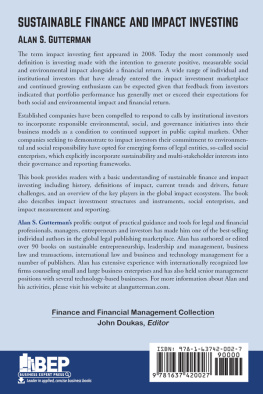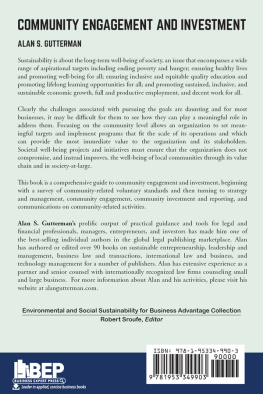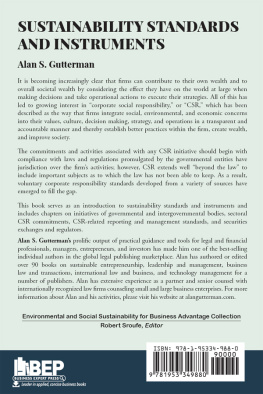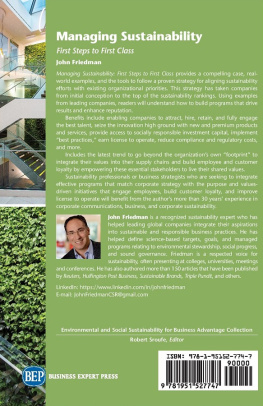
Managing Sustainability
Managing Sustainability is a comprehensive guide to governing, leading, and managing a successful sustainability-focused business.
Being a socially and environmentally responsible business is a worthy goal for many people; however, turning the goal into reality is a daunting process. This book takes a clear and practical approach to the nuts-and-bolts of achieving this goal, and covers steps to be taken by directors and executives to create and implement appropriate strategies, policies, and management systems. It recognizes that corporate social responsibility (CSR) is like any other important management initiative and requires proactive leadership from the top of the organization. Key topics include:
Understanding how CSR is changing the traditional fiduciary duties of directors and officers
Developing and implementing internal governance instruments to provide a foundation for decision-making around CSR
Integrating CSR into the duties and responsibilities of the chief executive officer and other members of the C-suite team, as well as into their compensation arrangements
Conducting continuous audits and assessments of the sustainability governance and management framework using certification and rating systems to evaluate and improve CSR performance and effectiveness
Current and aspiring leaders wishing to build a sustainability-centered business will appreciate the straightforward and actionable guidance offered by this book.
Alan S. Gutterman is the Founding Director of the Sustainable Entrepreneurship Project (www.seproject.org), a best-selling author of legal and business publications and a widely recognized business counselor.
First published 2021
by Routledge
52 Vanderbilt Avenue, New York, NY 10017
and by Routledge
2 Park Square, Milton Park, Abingdon, Oxon OX14 4RN
Routledge is an imprint of the Taylor & Francis Group, an informa business
2021 Alan S. Gutterman
The right of Alan S. Gutterman to be identified as author of this work has been asserted by him in accordance with sections 77 and 78 of the Copyright, Designs and Patents Act 1988.
All rights reserved. No part of this book may be reprinted or reproduced or utilised in any form or by any electronic, mechanical, or other means, now known or hereafter invented, including photocopying and recording, or in any information storage or retrieval system, without permission in writing from the publishers.
Trademark notice: Product or corporate names may be trademarks or registered trademarks, and are used only for identification and explanation without intent to infringe.
British Library Cataloguing-in-Publication Data
A catalogue record for this book is available from the British Library
Library of Congress Cataloging-in-Publication Data
Names: Gutterman, Alan S., 1955 author.
Title: Managing sustainability / Alan S. Gutterman.
Description: New York: Routledge, 2020. | Includes bibliographical references and index. |
Identifiers: LCCN 2020028810 (print) | LCCN 2020028811 (ebook) | ISBN 9780367518554 (hardback) | ISBN 9780367518547 (paperback) | ISBN 9781003055440 (ebook)
Subjects: LCSH: Social responsibility of business. | Industrial managementEnvironmental aspects. | Strategic planningEnvironmental aspects.
Classification: LCC HD60 .G88 2020 (print) | LCC HD60 (ebook) | DDC 658.4/083dc23
LC record available at https://lccn.loc.gov/2020028810
LC ebook record available at https://lccn.loc.gov/2020028811
ISBN: 978-0-367-51855-4 (hbk)
ISBN: 978-0-367-51854-7 (pbk)
ISBN: 978-1-003-05544-0 (ebk)
Typeset in Times New Roman
by codeMantra
Corporate sustainability and corporate social responsibility (CSR) are like any other important management initiatives and require proactive leadership from the top of the organization. In fact, it is clear that the tone at the top is an important factor in the success or failure of any sustainability initiative and that the directors, executive officers and senior managers of the organization are uniquely positioned to act as internal champions of sustainability and proactively communicate with everyone in the organization on a daily basis about the impact of new environmental and social products, services and activities (e.g., philanthropic projects) and sustainability-related systems and processes. Sustainability requires a paradigm shift by organizations, pushing them to look beyond economic performance to consider the impact of their activities on the environment and society in which they operate and on stakeholders other than the owners of the organization; however, the pursuit of sustainability relies on many of the same basic governance and management processes used everywhere in the business world (e.g., planning, acquiring and deploying resources, building products and systems and monitoring execution of day-to-day operations). At the same time, the emergence of corporate sustainability has fueled interest in new skill sets including sustainable leadership and ethical management.
Being a socially and environmentally responsible business is a worthy goal for many people; however, turning the goal into reality is a daunting process. Successfully governing, leading and managing a sustainability-focused business begins with understanding the fundamental principles and activities associated with corporate governance, leadership and management that are outlined in the opening chapter of this volume. Thereafter we turn to a comprehensive menu of the subjects, issues and activities associated with sustainability governance and management to present and discuss the relevant research and suggestions for integrating sustainability into the practice of management. The table of contents for this volume serves as a valuable checklist for the steps that need to be taken:
Understanding how sustainability is changing the traditional fiduciary duties of directors and officers including the ascendance of the stakeholder-focused model
Ensuring that the board of directors integrates environmental and social responsibility into the governance structure and the traditional roles and responsibilities of directors
Designing and implementing an effective framework for board oversight of sustainability and CSR and development and implementation of organizational strategies that integrate meaningful sustainability commitments and targets
Designing effective internal organizational structures and systems for managing sustainability initiatives and programs and supporting sustainability and CSR commitments and expectations such as preparation and distribution of sustainability reports and stakeholder engagement
Integrating sustainability into the duties and responsibilities of the chief executive officer and other members of the C-suite team, as well as into their compensation arrangements, and developing job responsibilities and performance metrics for a new breed of sustainability executives
Understanding the leadership styles, behaviors and actions that have been identified as being the most effective for leading sustainability- focused initiatives
Implementing formal management systems relating to sustainability- related issues such as the environment, social responsibility and supply chain security and processes for collecting and analyzing information to assess the performance and effectiveness of sustainability- related initiatives
Next page











